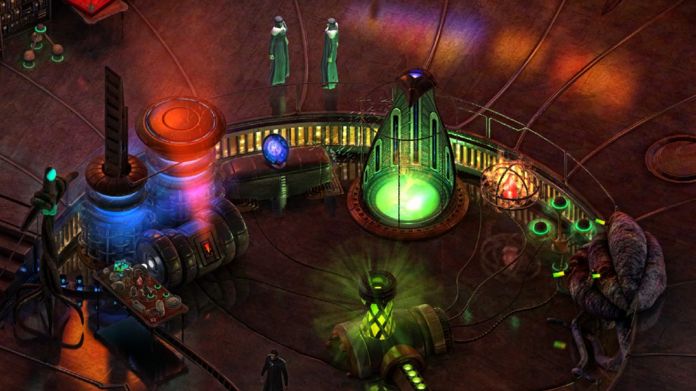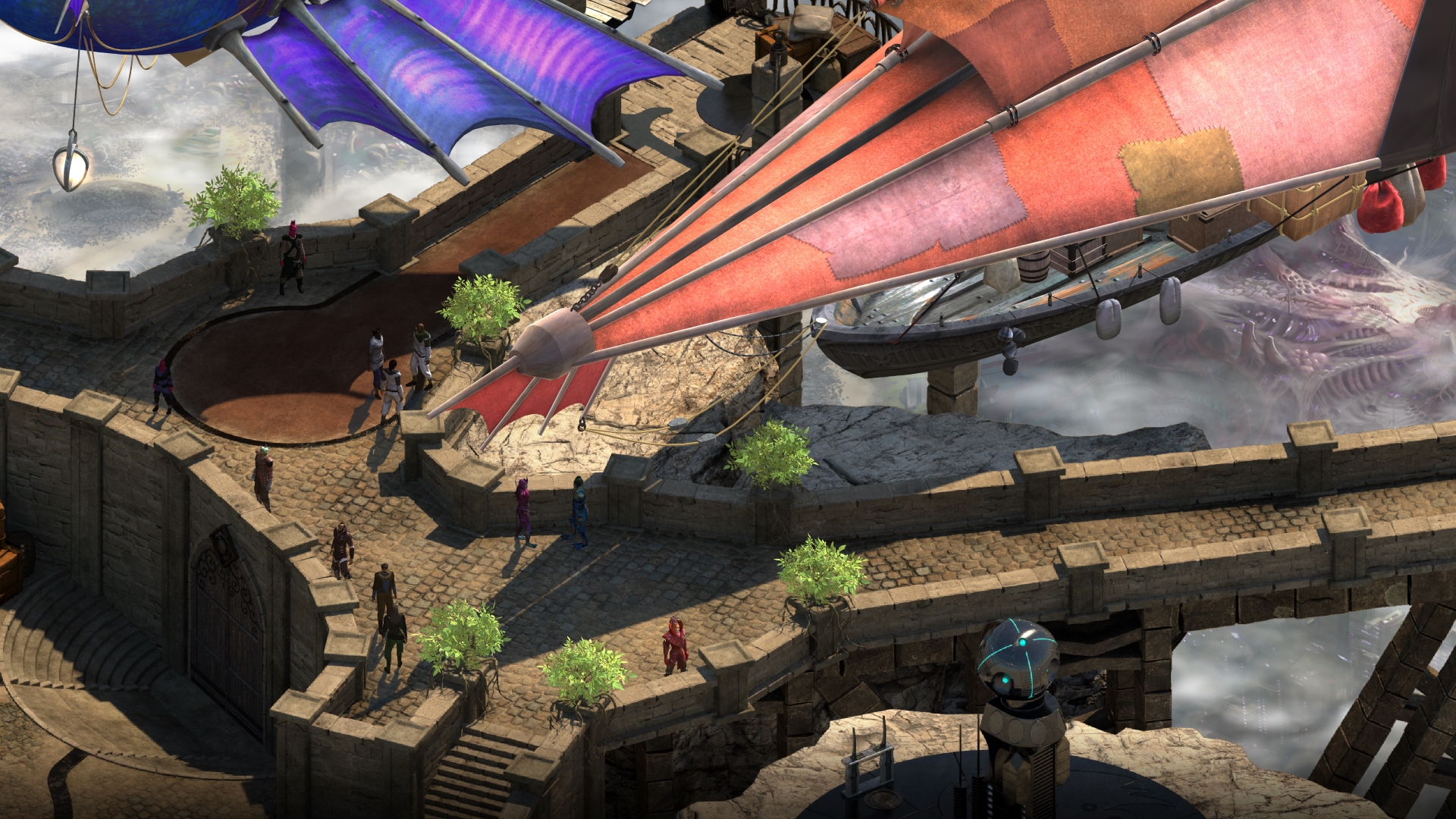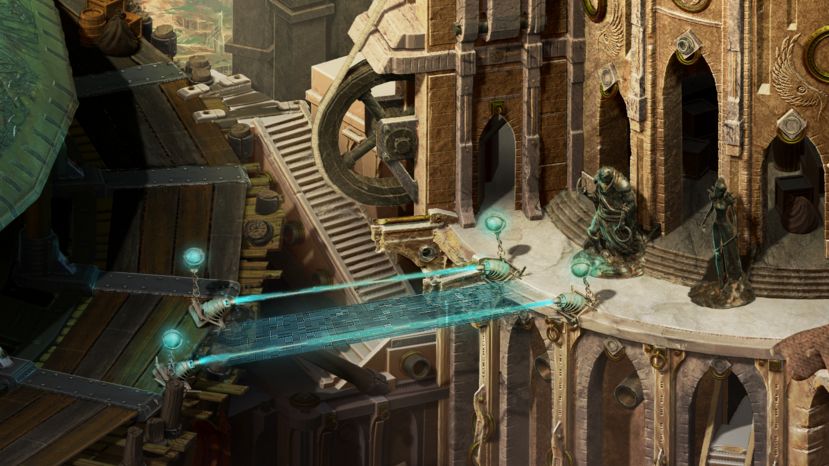Tides of Numenera is a raw, promising take on Monte Cook's universe

You are the Last Castoff, a body discarded by a self-made god that leaves newly-self aware selves behind every time he or she decides that they fancy a new form. In the opening seconds of Torment: Tides of Numenera you come into being just as you finish falling to your death, which is unfortunate, and what follows is a sequence that sees you rebuild yourself, personality-quiz style, from within your own infinity-variable consciousness. With me so far? Good—because then you've got some memory-spelunking, body-switching time travel to do. And then the tutorial ends.
Once in the world proper, your quest is to free yourself from the Sorrow—a formless beast tracking you and your kind through history. You're immediately given a choice of companions and approach, and no, combat isn't mandatory. My own journey began with half a battle and a stint spent impersonating a city official to spare a man from being strangled by a flesh cord spun out of his own drug-induced nightmares (don't ask). Yours can, and hopefully will, be different. This is a promising start to a long-awaited RPG, and one I don't want to spoil.
Torment: Tides of Numenera is a return to the past in a number of ways. It's a spiritual successor to one of the deepest and most beloved CRPGs ever made, Planescape: Torment. It's isometric, partly turn-based, and heavy on detail-rich pre-rendered backdrops. The age of Kickstarter has already recovered apocalyptic black comedy and traditional fantasy from their time-locked 90s prisons: now it delivers the third and final part of that classic RPG triumvirate, 'existential sci-fi-magical psychofantasy where lots of stuff is purple'.

Tides of Numenera is also something new, however. This is the first time Monte Cook Games' Numenera setting has been adapted to the PC. I've been playing the pen and paper game for a few years, and this is a thoughtful digital translation of the system. The broad strokes are this: instead of a health bar, you have three pools—Might, Speed, and Intellect. These can be damaged by enemies, but you also spend from them in order to increase your chances of success in every action you take: this is called 'expending effort'.
Example one: I am punching an attacker in the face. I can take my chances, or I can expend a little Might to ensure the attack connects. Example two: I am now explaining to the same attacker, moments later, that this was all a huge mistake. This time, I can invest Intellect to convince him that, nah, it's not worth it—potentially saving myself the Might I'd lose if he continued whacking me. This is an actual example from play (see above) although I've dialled back the details to spare you spoilers.
Enthusiastic readers of high-concept sci-fi will get a huge amount out of Torment, I think, but the emphasis here is on 'readers'. Like its cousin Pillars of Eternity, this is a game that wants you to take the time to read and absorb everything it's telling you. This isn't backmatter in the sense that implies 'skip this bit to get to the fighting and kissing'. The writing is the important stuff, the meat of the game, the detail that brings a capital-W Weird world to life. For as long as the rest of the games industry has marched under the banner 'games can be like films', traditional CRPGs like Torment have stood holding the placard marked '...and also like books.'

Unlike Pillars of Eternity, however, Tides of Numenera offers few traditional fantasy footholds. The Numenera setting delights in unsettling expectations, and while there are analogues for monsters and magic they never match up perfectly. The game is set in Earth's far far future, and civilization has done a few billion laps around Clarke's third law in that time. Magic is science, science is thought, thought is matter, and every grain of matter is imbued with magic. I've run pen-and-paper campaigns in this world for almost two years and I found myself pausing to make sure I understood all of the ideas that Tides of Numenera throws up in its first hour. This is a caveat, but also an endorsement: every old-school Torment fan who worried that their favourite RPG might lose its sense of strange in the absence of the Planescape license can be reassured that this isn't the case.
Keep up to date with the most important stories and the best deals, as picked by the PC Gamer team.
It's possible to pay for access to the beta, but Torment is currently in an extremely raw state. I experienced crashes, loss of progress and bugged quests in my time with this early version, and entire features and plot points are absent. Invest if you'd like to be involved in testing the game, but hold off if you want the best possible experience of this story. inXile tout the game's replayability, but you only get one first run: at present, you'd thank yourself for waiting until the game is further along.
Joining in 2011, Chris made his start with PC Gamer turning beautiful trees into magazines, first as a writer and later as deputy editor. Once PCG's reluctant MMO champion , his discovery of Dota 2 in 2012 led him to much darker, stranger places. In 2015, Chris became the editor of PC Gamer Pro, overseeing our online coverage of competitive gaming and esports. He left in 2017, and can be now found making games and recording the Crate & Crowbar podcast.


